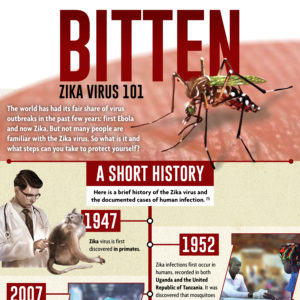Bitten: Zika Virus 101
The world has had its fair share of virus outbreaks in the past few years: first Ebola and now Zika. But not many people are familiar with the Zika virus. So what is it and what steps can you take to protect yourself?
A Short History
Here is a brief history of the Zika virus and the documented cases of human infection. (1)
1947
Zika virus is first discovered in primates.
1952
Zika infections first occur in humans, recorded in both Uganda and the United Republic of Tanzania. It was discovered that mosquitoes were carrying the virus and transmitting it through biting.
2007
14 known cases of Zika documented.
2013
An outbreak of Zika occurs in French Polynesia.
2015
An outbreak occurs in Brazil, where it is found that along with its most common symptoms, Zika can cause neurological and autoimmune complications.
2016
Zika virus is declared a public health emergency concern by the World Health Organization (WHO).
Common Symptoms
Fever
Rash
Joint pain
Muscle pain
Red or bloodshot eyes
Headache
Fatigue
Pregnant women especially should avoid traveling to infected or mosquito-ridden areas, as the virus can transfer from mother to fetus, sometimes causing microcephaly in newborns.(1)
35
Number of infants born with microcephaly during the 2015 outbreak of Zika in Brazil (1)
2-7 days
Average length of symptoms (3)
Anyone infected is at risk of developing Guillain-Barré syndrome, a disorder where the body’s immune system attacks nerves, sometimes causing paralysis. (3)
The prevalence of Guillain-Barré syndrome is around 6 to 40 cases per 1 million people. (2)
Where Is Zika?
Active Zika virus transmission map (1)
Aruba
Barbados
Bolivia
Bonaire
Brazil
Colombia
Puerto Rico
Costa Rica
Cuba
Curacao
Dominica
Dominican Republic
Ecuador
El Salvador
French Guiana
Guadeloupe
Guatemala
Guyana
Haiti
Honduras
Jamaica
Martinique
Mexico
Nicaragua
Panama
Paraguay
Saint Martin
Saint Vincent and the Grenadines
Sint Maarten
Suriname
Trinidad and Tobago
U.S. Virgin Islands
Venezuela
American Samoa
Fiji
Federated States of Micronesia
Marshall Islands
New Caledonia
Samoa
Tonga
Cape Verde
Prevention Tips
More research needs to be done on the transmission of the Zika virus, but the Centers for Disease Control (CDC) has still issued some prevention tips based on what we do know. (1, 3)
Do not travel to countries with high transmission rates.
Most mosquitoes that carry the virus are out during the day, so wear protective clothing and use a bug repellent spray during this time.
Always reapply bug repellent according to product directions.
Use mosquito netting if available, particularly for newborns in cribs or playpens.
Avoid sexual contact if infected with the virus.
Sources:

